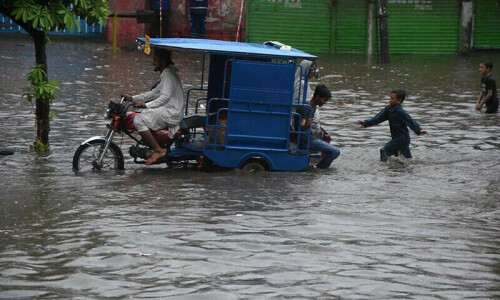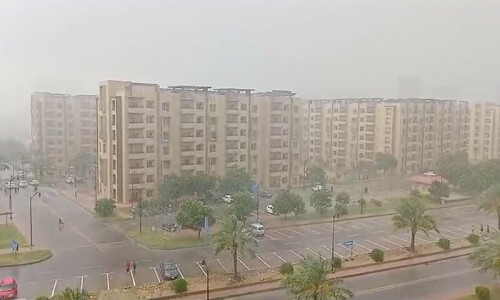ISLAMABAD: The Provincial Disaster Management Authority (PDMA) of Punjab has warned of torrential rains that are expected to hit the province over the next couple of days.
In addition, officials from the National Disaster Management Authority (NDMA) have warned that an early onset monsoon, which is expected to bring more than normal rainfall, could pose a threat to the agriculture sector as well as causing urban flooding
In a statement, PDMA Director General Irfan Ali Kathia warned of the risk of flooding in the hilly areas of Dera Ghazi Khan. Residents of settlements along rivers have also been asked to take special precautions.
Since the next few days would also see Muharram gatherings across the country, the PDMA official said the organisers of such processions should also take protective measures while keeping in mind the severity of the weather.
According to the authority, distance should be maintained from electric poles and wires, no gatherings should be held on dilapidated roofs and crossing rivers and streams should be avoided as much as possible during this time.
Additionally, PDMA has directed rescue departments to remain vigilant, particularly on days when heavy rain is expected.
Meanwhile, NDMA’s National Emergencies Operations Centre (NEOC) has projected that in Punjab, cities like Lahore, Rawalpindi, Faisalabad, and Gujranwala frequently experience urban flooding. Khyber Pakhtunkhwa’s (KP) areas, such as Peshawar, Swat, Abbottabad, Dir, Mansehra, and Kohistan, face flash floods and landslides.
In Sindh, Sukkur, Larkana, Karachi and Hyderabad can experience heavy rains and flooding.
Gilgit-Baltistan (GB) is also prone to landslides and disruptions due to heavy rainfall. However, Azad Jammu and Kashmir (AJK) is vulnerable to landslides, flash floods, and infrastructure damage in areas like Muzaffarabad.
A senior NDMA official told the Associated Press of Pakistan that excessive rainfall can inundate fields, leading to crop losses, especially for water-sensitive crops like wheat and cotton. However, heavy rains can wash away topsoil, reducing soil fertility and negatively affecting future crop yields, he said.
Erratic rain patterns can disrupt the agricultural calendar, delaying planting and harvesting times, which can reduce crop quality and yield. Increased humidity and standing water create favorable conditions for pests and diseases, further harming crops.
Over the past two decades, climate change has intensified the monsoon, causing more erratic and extreme rainfall patterns, with increased instances of both severe droughts and floods.
Published in Dawn, July 15th, 2024















































Dear visitor, the comments section is undergoing an overhaul and will return soon.